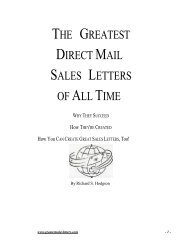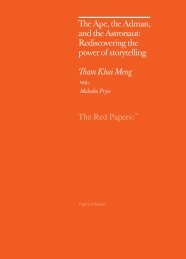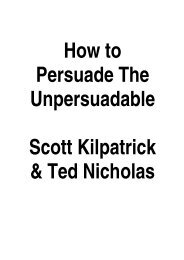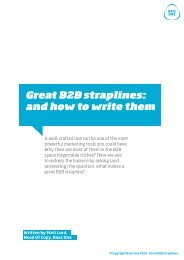- Page 1 and 2:
THE GREATEST DIRECT MAIL SALES LETT
- Page 3 and 4:
THE GREATEST DIRECT MAIL SALES LETT
- Page 5 and 6:
THE GREATEST DIRECT MAIL SALES LETT
- Page 7 and 8:
THE GREATEST DIRECT MAIL SALES LETT
- Page 9 and 10:
THE GREATEST DIRECT MAIL SALES LETT
- Page 11 and 12:
THE GREATEST DIRECT MAIL SALES LETT
- Page 13 and 14:
THE GREATEST DIRECT MAIL SALES LETT
- Page 15 and 16:
TABLE 1 100 MOTIVATIONS FOR PEOPLE
- Page 17 and 18:
BEFORE THE WRITING STARTS Most expe
- Page 19 and 20:
whoever has that responsibility mus
- Page 21 and 22:
In my direct mail seminars, I've su
- Page 23 and 24:
7. A definite statement of value to
- Page 25 and 26:
1. Does the lead sentence get in st
- Page 27 and 28:
expression that stops your reader a
- Page 29 and 30:
Strong management will make it a po
- Page 31 and 32:
In this section, more than 100 grea
- Page 33 and 34:
www.greatestsalesletters.com - 33 -
- Page 35 and 36:
www.greatestsalesletters.com - 35 -
- Page 37 and 38:
www.greatestsalesletters.com - 37 -
- Page 39 and 40:
www.greatestsalesletters.com - 39 -
- Page 41 and 42:
THE READER'S DIGEST "TWO PENNIES" L
- Page 43 and 44:
www.greatestsalesletters.com - 43 -
- Page 45 and 46:
www.greatestsalesletters.com - 45 -
- Page 47 and 48:
www.greatestsalesletters.com - 47 -
- Page 49 and 50:
www.greatestsalesletters.com - 49 -
- Page 51 and 52:
www.greatestsalesletters.com - 51 -
- Page 53 and 54:
www.greatestsalesletters.com - 53 -
- Page 55 and 56:
BARRON'S "WIDOW & ORPHANS" LETTER A
- Page 57 and 58:
www.greatestsalesletters.com - 57 -
- Page 59 and 60:
www.greatestsalesletters.com - 59 -
- Page 61 and 62:
your part. They're our gift to you,
- Page 63 and 64:
www.greatestsalesletters.com - 63 -
- Page 65 and 66:
www.greatestsalesletters.com - 65 -
- Page 67 and 68:
www.greatestsalesletters.com - 67 -
- Page 69 and 70:
www.greatestsalesletters.com - 69 -
- Page 71 and 72:
www.greatestsalesletters.com - 71 -
- Page 73 and 74:
www.greatestsalesletters.com - 73 -
- Page 75 and 76:
www.greatestsalesletters.com - 75 -
- Page 77 and 78:
GAMES MAGAZINE "CONNECT THE DOTS" L
- Page 79 and 80:
www.greatestsalesletters.com - 79 -
- Page 81 and 82:
So we bought 13 of these islands. T
- Page 83 and 84:
www.greatestsalesletters.com - 83 -
- Page 85 and 86:
www.greatestsalesletters.com - 85 -
- Page 87 and 88:
www.greatestsalesletters.com - 87 -
- Page 89 and 90:
www.greatestsalesletters.com - 89 -
- Page 91 and 92:
www.greatestsalesletters.com - 91 -
- Page 93 and 94:
www.greatestsalesletters.com - 93 -
- Page 95 and 96:
THE FIRST BAPTIST CHURCH "ORGAN" LE
- Page 97 and 98:
THE FRANKLIN MINT "100 GREATEST BOO
- Page 99 and 100:
www.greatestsalesletters.com - 99 -
- Page 101 and 102:
www.greatestsalesletters.com - 101
- Page 103 and 104:
BRECK'S PERSONALIZED CATALOG WRAPS
- Page 105 and 106:
HOMPSON CIGAR COMPANY "15 RIVERS TO
- Page 107 and 108:
www.greatestsalesletters.com - 107
- Page 109 and 110:
AMERICAN BIBLE SOCIETY "YOUR FAITH
- Page 111 and 112:
www.greatestsalesletters.com - 111
- Page 113 and 114:
HEWLETT-PACKARD POCKET CALCULATOR L
- Page 115 and 116:
www.greatestsalesletters.com - 115
- Page 117 and 118:
www.greatestsalesletters.com - 117
- Page 119 and 120:
www.greatestsalesletters.com - 119
- Page 121 and 122:
www.greatestsalesletters.com - 121
- Page 123 and 124:
www.greatestsalesletters.com - 123
- Page 125 and 126:
www.greatestsalesletters.com - 125
- Page 127 and 128:
DIRECT MARKETING EDUCATIONAL FOUNDA
- Page 129 and 130:
www.greatestsalesletters.com - 129
- Page 131 and 132:
www.greatestsalesletters.com - 131
- Page 133 and 134:
www.greatestsalesletters.com - 133
- Page 135 and 136:
probably have made me add some kind
- Page 137 and 138:
www.greatestsalesletters.com - 137
- Page 139 and 140:
The big unions had announced that t
- Page 141 and 142:
www.greatestsalesletters.com - 141
- Page 143 and 144:
www.greatestsalesletters.com - 143
- Page 145 and 146:
www.greatestsalesletters.com - 145
- Page 147 and 148:
NATIONAL REPUBLICAN SENATORIAL COMM
- Page 149 and 150:
www.greatestsalesletters.com - 149
- Page 151 and 152:
www.greatestsalesletters.com - 151
- Page 153 and 154:
www.greatestsalesletters.com - 153
- Page 155 and 156:
www.greatestsalesletters.com - 155
- Page 157 and 158:
JOHN YECK'S "LET'S HAVE BETTER MOTT
- Page 159 and 160:
THE GREATEST DIRECT MAIL SALES LETT
- Page 161 and 162:
www.greatestsalesletters.com - 161
- Page 163 and 164:
www.greatestsalesletters.com - 163
- Page 165 and 166:
www.greatestsalesletters.com - 165
- Page 167 and 168:
www.greatestsalesletters.com - 167
- Page 169 and 170:
www.greatestsalesletters.com - 169
- Page 171 and 172:
BANKER'S LIFE "ONE WOMAN TO ANOTHER
- Page 173 and 174:
www.greatestsalesletters.com - 173
- Page 175 and 176:
www.greatestsalesletters.com - 175
- Page 177 and 178:
www.greatestsalesletters.com - 177
- Page 179 and 180:
www.greatestsalesletters.com - 179
- Page 181 and 182:
www.greatestsalesletters.com - 181
- Page 183 and 184:
www.greatestsalesletters.com - 183
- Page 185 and 186:
there had been independence. Now th
- Page 187 and 188:
www.greatestsalesletters.com - 187
- Page 189 and 190:
www.greatestsalesletters.com - 189
- Page 191 and 192:
www.greatestsalesletters.com - 191
- Page 193 and 194:
FRANK LEWIS "MIRACLE GRAPEFRUIT" LE
- Page 195 and 196:
www.greatestsalesletters.com - 195
- Page 197 and 198:
www.greatestsalesletters.com - 197
- Page 199 and 200:
www.greatestsalesletters.com - 199
- Page 201 and 202:
www.greatestsalesletters.com - 201
- Page 203 and 204:
www.greatestsalesletters.com - 203
- Page 205 and 206:
www.greatestsalesletters.com - 205
- Page 207 and 208:
BUSINESS WEEK "INVITATION" LETTER I
- Page 209 and 210:
www.greatestsalesletters.com - 209
- Page 211 and 212:
BUSINESS WEEK "INVITATION" LETTER I
- Page 213 and 214:
www.greatestsalesletters.com - 213
- Page 215 and 216:
www.greatestsalesletters.com - 215
- Page 217 and 218:
www.greatestsalesletters.com - 217
- Page 219 and 220:
www.greatestsalesletters.com - 219
- Page 221 and 222:
www.greatestsalesletters.com - 221
- Page 223 and 224:
QUEST/78 "CHARTER SUBSCRIPTION" LET
- Page 225 and 226:
If it's been too long since you've
- Page 227 and 228:
Right away, you save a welcome $3.0
- Page 229 and 230:
www.greatestsalesletters.com - 229
- Page 231 and 232:
www.greatestsalesletters.com - 231
- Page 233 and 234:
PREVENTION MAGAZINE "MEMORIES OF GR
- Page 235 and 236:
www.greatestsalesletters.com - 235
- Page 237 and 238:
www.greatestsalesletters.com - 237
- Page 239 and 240:
www.greatestsalesletters.com - 239
- Page 241 and 242:
www.greatestsalesletters.com - 241
- Page 243 and 244:
FLY FISHERMAN MAGAZINE "TROUT SPOKE
- Page 245 and 246:
www.greatestsalesletters.com - 245
- Page 247 and 248:
www.greatestsalesletters.com - 247
- Page 249 and 250:
www.greatestsalesletters.com - 249
- Page 251 and 252:
TIME-LIFE BOOKS "COWBOY" LETTER Whe
- Page 253 and 254:
www.greatestsalesletters.com - 253
- Page 255 and 256:
www.greatestsalesletters.com - 255
- Page 257 and 258:
www.greatestsalesletters.com - 257
- Page 259 and 260:
THE GREATEST DIRECT MAIL SALES LETT
- Page 261 and 262:
www.greatestsalesletters.com - 261
- Page 263 and 264:
NEW YORK ZOOLOGICAL SOCIETY "ZOOFER
- Page 265 and 266:
www.greatestsalesletters.com - 265
- Page 267 and 268:
www.greatestsalesletters.com - 267
- Page 269 and 270:
www.greatestsalesletters.com - 269
- Page 271 and 272:
www.greatestsalesletters.com - 271
- Page 273 and 274:
www.greatestsalesletters.com - 273
- Page 275 and 276:
UNITED REPUBLICAN FUND OF ILLINOIS
- Page 277 and 278:
www.greatestsalesletters.com - 277
- Page 279 and 280:
THE MIAMI UNIVERSITY FUND "EDDIE RI
- Page 281 and 282:
NATIONAL FEDERATION OF THE BLIND PE
- Page 283 and 284:
www.greatestsalesletters.com - 283
- Page 285 and 286:
www.greatestsalesletters.com - 285
- Page 287 and 288:
www.greatestsalesletters.com - 287
- Page 289 and 290:
www.greatestsalesletters.com - 289
- Page 291 and 292:
CHRISTINA L. WOODS MEMORIAL FUND LE
- Page 293 and 294:
THE NATIONAL TRUST FOR HISTORIC PRE
- Page 295 and 296:
www.greatestsalesletters.com - 295
- Page 297 and 298:
www.greatestsalesletters.com - 297
- Page 299 and 300:
www.greatestsalesletters.com - 299
- Page 301 and 302:
www.greatestsalesletters.com - 301
- Page 303 and 304:
SECTION VI BUSINESS-TO-BUSINESS DIR
- Page 305 and 306:
XEROX "USED COPIERS" LETTER When yo
- Page 307 and 308:
www.greatestsalesletters.com - 307
- Page 309 and 310:
www.greatestsalesletters.com - 309
- Page 311 and 312:
www.greatestsalesletters.com - 311
- Page 313 and 314:
www.greatestsalesletters.com - 313
- Page 315 and 316:
www.greatestsalesletters.com - 315
- Page 317 and 318:
www.greatestsalesletters.com - 317
- Page 319 and 320:
INGHAM HALL, LTD. "LAWYER" LETTER P
- Page 321 and 322:
www.greatestsalesletters.com - 321
- Page 323 and 324:
www.greatestsalesletters.com - 323
- Page 325 and 326:
www.greatestsalesletters.com - 325
- Page 327 and 328:
www.greatestsalesletters.com - 327
- Page 329 and 330:
www.greatestsalesletters.com - 329
- Page 331 and 332:
YECK BROTHERS COMPANY "GRANDFATHER'
- Page 333 and 334:
THE GREATEST DIRECT MAIL SALES LETT
- Page 335 and 336:
www.greatestsalesletters.com - 335
- Page 337 and 338:
R. R. DONNELLEY & SONS COMPANY "FOU
- Page 339 and 340:
www.greatestsalesletters.com - 339
- Page 341 and 342:
www.greatestsalesletters.com - 341
- Page 343 and 344:
WESTINGHOUSE SECURITY SYSTEMS "CONS
- Page 345 and 346:
www.greatestsalesletters.com - 345
- Page 347 and 348:
TROY-BILT "INQUIRY ANSWERING" LETTE
- Page 349 and 350:
www.greatestsalesletters.com - 349
- Page 351 and 352:
GENERAL TELEPHONE COMPANY OF ILLINO
- Page 353 and 354:
www.greatestsalesletters.com - 353
- Page 355 and 356:
CHAMPION "HERE IT IS A SECOND TIME"
- Page 357 and 358:
SECTION VIII RETAIL AND SERVICE LET
- Page 359 and 360:
THE ALLEY DELI "FREE LUNCH" LETTER
- Page 361 and 362:
DICK'S SUPERMARKETS "CONGRATULATION
- Page 363 and 364:
UNITED STATES MARINE CORPS "YES-NO"
- Page 365 and 366:
www.greatestsalesletters.com - 365
- Page 367 and 368:
www.greatestsalesletters.com - 367
- Page 369 and 370:
www.greatestsalesletters.com - 369
- Page 371 and 372:
ROBERT BARTLETT REALTY CO. "JUST SU
- Page 373 and 374:
FAIRVIEW MEDICAL RESEARCH SURVEY ON
- Page 375 and 376:
371 www.greatestsalesletters.com -
- Page 377 and 378:
www.greatestsalesletters.com - 377
- Page 379 and 380:
THE PRESIDENTIAL CARD "DID I LOSE A
- Page 381 and 382:
BACHE FINANCIAL PLANNING "RATING A
- Page 383 and 384:
www.greatestsalesletters.com - 383
- Page 385 and 386:
SECTION IX PERSONALIZED LETTERS Som
- Page 387 and 388: READER'S DIGEST LETTERS No one uses
- Page 389 and 390: www.greatestsalesletters.com - 389
- Page 391 and 392: TIME-LIFE BOOKS NON-COMPUTER PERSON
- Page 393 and 394: www.greatestsalesletters.com - 393
- Page 395 and 396: www.greatestsalesletters.com - 395
- Page 397 and 398: www.greatestsalesletters.com - 397
- Page 399 and 400: www.greatestsalesletters.com - 399
- Page 401 and 402: QUILL CATALOG "WRAP" LETTERS Two ca
- Page 403 and 404: www.greatestsalesletters.com - 403
- Page 405 and 406: www.greatestsalesletters.com - 405
- Page 407 and 408: CANADIAN OFFICE OF TOURISM LETTERS
- Page 409 and 410: www.greatestsalesletters.com - 409
- Page 411 and 412: www.greatestsalesletters.com - 411
- Page 413 and 414: www.greatestsalesletters.com - 413
- Page 415 and 416: SECTION X THE LIGHT TOUCH Direct ma
- Page 417 and 418: Letter No. 2: i am s. mouse of s. r
- Page 419 and 420: Letter No. 4: i am s. mouse of s. r
- Page 421 and 422: Letter No. 6: i am s. mouse of s. r
- Page 423 and 424: PLAZA HOTEL "LETTERS FROM A CHAMBER
- Page 425 and 426: Letter No. 2 The second letter sent
- Page 427 and 428: Letter No. 4 On May 9,1963, still a
- Page 429 and 430: SECTION XIV TIPS FROM THE EXPERTS A
- Page 431 and 432: • Form letters using indented par
- Page 433 and 434: 12. Use "carrier" words and phrases
- Page 435 and 436: 11. Tie newness to an established b
- Page 437: Bus REED'S THREE BS A handy formula
- Page 441 and 442: 4. Resist the temptation to display
- Page 443 and 444: 4. The sin of being noisy. Everybod
- Page 445 and 446: Does the total package get the read
- Page 447 and 448: 1. The best way is the simple way.
- Page 449 and 450: 5. Not only is it necessary to star
- Page 451 and 452: By writing and rewriting, you will
- Page 453 and 454: d. splitting infinitives e. repeati
- Page 455 and 456: 13. Have unknown, unusual, or forei
- Page 457: BIBLIOGRAPHY Andrews, Francis S. Bi






